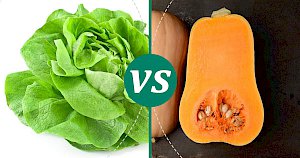Butternut Squash vs Lettuce: Nutrition & Calories Compare


Butternut squash vs Lettuce
Nutrition Facts
Serving size:
change
5g10g15g20g30g40g50g60g80g100g120g140g160g180g200g220g250g300g350g400g450g500g600g700g800g900g1000g
1oz2oz3oz4oz5oz6oz7oz8oz10oz12oz15oz20oz25oz30oz35oz40oz50oz
Amount Per Serving:
Serving size:
change
5g10g15g20g30g40g50g60g80g100g120g140g160g180g200g220g250g300g350g400g450g500g600g700g800g900g1000g
1oz2oz3oz4oz5oz6oz7oz8oz10oz12oz15oz20oz25oz30oz35oz40oz50oz
Amount Per Serving:
Butternut Squash vs Lettuce 100g Compare
| per 100g | Butternut squash | Lettuce |
|---|---|---|
| Calories | 45 | 15 |
| Carbohydrates | 11.69 g | 2.87 g |
| Fat | 0.1 g | 0.15 g |
| Dietary fiber | 2 g | 1.3 g |
| Protein | 1 g | 1.36 g |
| Calcium | 48 mg | 36 mg |
| Iron | 0.7 mg | 0.86 mg |
| Magnessium | 34 mg | 13 mg |
| Phosphorus | 33 mg | 29 mg |
| Potassium | 352 mg | 194 mg |
| Sodium | 4 mg | 28 mg |
| Zink | 0.15 mg | 0.18 mg |
| Vitaminium A | 10630 µg | 7405 µg |
| Vitaminium B1 (Thiamine) | 0.1 mg | 0.07 mg |
| Vitaminium B2 (riboflavin) | 0.02 mg | 0.08 mg |
| Vitaminium B3 (Niacin) | 1.2 mg | 0.375 mg |
| Vitaminium B5 | 0.4 mg | 0.134 mg |
| Vitaminium B6 | 0.154 mg | 0.09 mg |
| Vitaminium B9 (Folic acid) | 27 mg | 38 mg |
| Vitaminium C | 21 mg | 9.2 mg |
| Vitaminium E | 1.44 mg | 0.29 mg |
| Vitaminium K | 1.1 µg | 126.3 µg |
| Beta karoten | 4226 mg | 4443 mg |
Exploring the Nutritional Profiles of Butternut Squash and Lettuce
When it comes to making healthier food choices, understanding the nutritional value of your options is key. Butternut squash and lettuce, for instance, are both popular ingredients in a variety of dishes, from hearty autumn soups to fresh summer salads. While they might sit on opposite ends of the flavor spectrum, both bring their unique set of nutrients to the table. Let's dive into some interesting facts about these two before comparing their nutritional profiles.
Interesting Facts about Butternut Squash
Butternut squash is a type of winter squash that grows on a vine. It has a sweet, nutty taste that becomes even more pronounced when cooked. This squash is not only delicious but also packed with vitamins, minerals, and antioxidants. It's particularly high in vitamins A and C, essential for eye health and immune function. Additionally, butternut squash is a versatile ingredient that can be roasted, mashed, or even used as a pasta substitute, making it a favorite among those looking to add more vegetables to their diet.
Interesting Facts about Lettuce
Lettuce, on the other hand, is a leafy green vegetable known for its role in salads. There are several varieties, including romaine, iceberg, and butterhead, each with a distinct taste and texture. Lettuce is high in water content, making it a refreshing choice, especially during the warmer months. It's also a good source of vitamin K, which is necessary for blood clotting and bone health. Due to its low calorie content, lettuce is a staple for those aiming for weight loss or maintaining a healthy weight.
Butternut Squash vs. Lettuce: A Nutritional Comparison
When comparing butternut squash vs. lettuce calories, butternut squash has 45 calories per 100 grams, while lettuce has only 15 calories. This makes lettuce a lower-calorie option, though both are considered low-calorie foods.
- Carbohydrates: Butternut squash has 11.69 grams, and lettuce has 2.87 grams, making squash a higher-carb choice.
- Fiber: With 2 grams of fiber, butternut squash edges out over lettuce's 1.3 grams, beneficial for digestive health.
- Fat: Both are low in fat, but lettuce contains slightly more with 0.15 grams compared to butternut squash's 0.1 grams.
- Protein: Lettuce offers slightly more protein with 1.36 grams, compared to 1 gram in butternut squash.
Looking at vitamins and minerals, butternut squash is a powerhouse of Vitamin A, providing 10630 IU, significantly higher than lettuce's 7405 IU. However, lettuce boasts a much higher Vitamin K content, essential for bone health, with 126.3 µg compared to butternut squash's 1.1 µg.
Both vegetables have their unique strengths: butternut squash is rich in vitamins and minerals like magnesium and potassium, while lettuce offers lower calories and a refreshing crunch with a high Vitamin K content.
Lettuce vs. Butternut Squash: The Verdict
Choosing between lettuce vs. butternut squash ultimately depends on your nutritional needs and taste preferences. For those looking to increase their vitamin A intake or seeking a higher-carb vegetable, butternut squash is an excellent choice. On the other hand, if you're aiming for a low-calorie option that's high in Vitamin K, lettuce is the way to go.
Both butternut squash and lettuce offer unique nutritional benefits and can be a part of a healthy, balanced diet. By understanding the nutritional content of these foods, you can make informed choices that align with your health goals and dietary preferences.
Butternut squash 100g
45kcalCalories source
- 91% CARBS.
- 8% PROTEIN
- 2% FAT
Lettuce 100g
15kcalCalories source
- 63% CARBS
- 30% PROTEIN
- 7% FAT
Compares of butternut squash
- Butternut Squash vs Artichoke
- Butternut Squash vs Asparagus
- Butternut Squash vs Beetroot
- Butternut Squash vs Calabash
- Butternut Squash vs Broccoli
- Butternut Squash vs Cabbage
- see all compares of butternut squash
Compares of lettuce
Read also:
- Calories from Butternut squash
- Calories of Cabbage
- Calories in Carrot
- Cassava calories per 100g
- Cauliflower protein per 100g
- How many calories does fodder cabbage have?
- Calories in a half of eggplant
- Calories in whole eggplant
- Calories for one, two or more eggplants
- Calories in slice of eggplant
- How much protein in endive?
Marcin Piotrowicz
calories-info.com creator
Healthy diet and healthy lifestyle promoter
Add comment